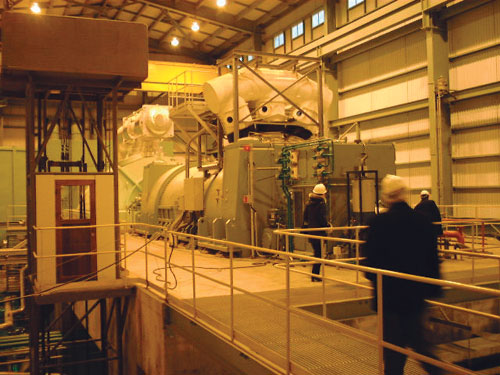Japan's Official Development Assistance White Paper 2005
Main Text > Part II ODA DISBURSEMENTS IN FISCAL YEAR 2004 > Chapter 2 Details and New Policies about Japan's ODA: Striving for Further ODA Reforms > Section 2. Measures for Each of the Priority Issues > 2.Sustainable Growth > (6) Cooperation with OOF and the Private Sector
(6) Cooperation with OOF and the Private Sector
When looking at the worldwide flow of funds to developing countries, in 2003, according to provisional DAC data, ODA accounted for 25.4% of the total, while other funds, such as OOF and private capital, accounted for three-fourths of the total amount. As this shows, coordinating with public and private funds other than ODA is as important as ODA itself to development. There is a massive demand for funds needed to support the development, maintenance, and management of infrastructures, notably in East Asia, whose demand for funds, according to the World Bank, is expected to exceed US$1 trillion over the next five years. Such demand cannot be fully met by the government funds of developing countries and the public funds from donor countries alone. Therefore, there is an increased need to promote infrastructure development through public- private partnerships under appropriate sharing of roles utilizing private funds and other resources. In fact, developments of economic and social infrastructures have been taking place in recent years in developing countries utilizing private-sector funds, technologies, and initiatives.
However, for private companies to develop their businesses in developing countries, there are restrictions on currency exchange and transmittance, and risks involved, such as changes in the legal system, wars, civil conflicts, and political instability. Therefore, it is difficult to actively expand businesses into developing countries, as many private financial institutions tend to be reluctant to provide loans for such purposes. To eliminate this hurdle, public organizations such as JBIC, NEXI, and ADB have been providing support to Japanese companies in their advancements into developing countries by underwriting insurance and offering massive loans in cooperation with private financial institutions.
Moreover, the use of OOF is beneficial in that it assists the development of Japanese companies overseas, and simultaneously develops infrastructure supporting economic growth in the countries receiving the loans. In particular, because the fruits of Build-Operate-Transfer ( BOT ) 24 Projects end up belonging to the recipient countries, such projects play a role in promoting the inflow of private funds and in developing infrastructures that lead to future economic developments for the recipient countries.
In Azerbaijan, which gained independence from the Soviet Union in 1991, the Azeri-Chirag-Gunashli ( ACG ) oilfield development project, which includes the construction of pipelines necessary for transporting crude oil from the oilfields, is underway with the participation of Japanese corporations under the BOT-scheme loans. In addition, Japan is providing assistance through yen loans for the construction of the latest gas-fired power plants, allowing for environmentally-friendly power generation using the natural gas generated through the oilfield development project.

Japan is providing assistance to Severnaya Natural Gas Combined Cycle Power Plant under the Azeri-Chirag-Gunashli (ACG) oilfield development project (Photo: JBIC)
Furthermore, to respond to the future electrical power shortage that is expected to occur in line with its economic development, Indonesia has launched a comprehensive electricity sector reform by promoting power resources development through the introduction of private funds, in addition to electricity infrastructure development through public funds. Japan has extended both "soft" and "hard" assistance in a comprehensive manner to Indonesia, including supports to the electricity sector reform and to power resources development, using various financial tools. Specifically, Japan has provided broad-based recommendations regarding the electricity sector reform in cooperation with the World Bank and the ADB. At the same time, Japan has been playing a leading role in developing the electrical power generation projects implemented by the private sector in concert with public export credit agencies, etc., of other countries. Moreover, Japan has made specific considerations, especially on Indonesia's electricity sector, with the Asia Electric Power Task Force regarding the promotion of infrastructure development through private funds and their linkage with public funds.
From the standpoint of assisting the economic growth of developing countries, it is extremely important to secure varieties of fund procurement in accordance with each development need. Based on this viewpoint, it is necessary to continue the provision of public funds such as ODA, OOF, and trade insurance, as well as the provision of funds through cooperation and mutual complementation with international development finance organizations in the future, and Japan will continue such efforts.
Furthermore, progress is being made to enhance ODA's linkage with the private sector. JICA has been advancing the Proposal of Technical Cooperation ( PROTECO ) project 25 to further utilize the vitality, creativity, and know-how of the private sector within the technical cooperation projects implemented in developing countries. In FY2004 contracts were made with the private sector to implement such projects as the Sub-regional Statistical Information System Development Project in Indonesia and the Project for Sustainable Arsenic Mitigation in Bangladesh, and adjustments are currently being made to get these projects under way. In addition, as for the Technical Cooperation Project Based on Operation Implementation Contracts, under which work is subcontracted to the private sector, the vitality of the private sector is actively utilized through 22 new contracts.
Since FY2001, JBIC has introduced pilot studies which aims to understand precisely the diversifying assistance needs among the developing countries while promoting public participation in yen-loan projects. These pilot studies aim to accumulate knowledge and information useful for yen-loan projects based on proposals submitted by organizations within Japan and to discover and formulate specific projects for the future. Six pilot studies for project formation, such as a project in Sri Lanka to improve the living environment of plantation workers, and nine pilot studies for knowledge assistance, including Morocco's Casa Blanca Waste Management Improvement Project, were implemented in FY2004.


 Next Page
Next Page